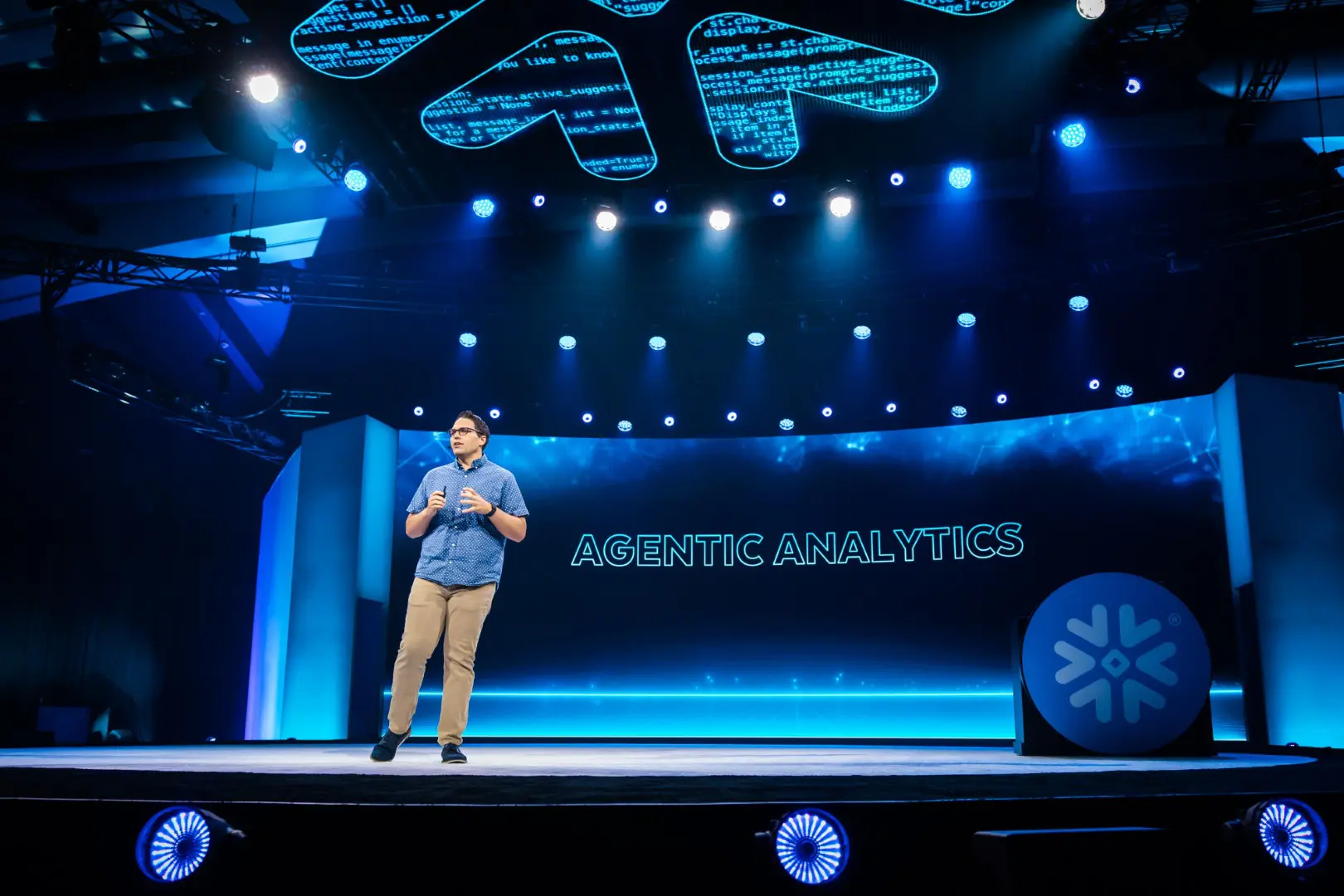Snowflake is ready for the avalanche of AI agents. As a company with deep roots in data, Snowflake is convinced that it can call itself the AI specialist par excellence.
It’s summer in San Francisco, but wherever Snowflake goes, it brings winter. Snowflakes fall from the sky, skiers on roller skates slalom between guests, and those who want can try a virtual ski jump: a tribute to co-founder Benoit Dageville’s love for winter sports. It’s in the smallest details. The overzealous air conditioning makes the Moscone Center feel chilly.
The Summit takes place at a turning point for Snowflake. The company wants to position itself, like any self-respecting technology company these days, as a reliable AI partner, without losing its original focus on data. “We cannot ignore AI”, Danica Fine, OSS Developer Relations, summarizes it in one sentence.
“Snowflake started from analytics, but since then we’ve expanded to the entire data cycle. We want to be there at the moment data is born. How we approach AI is no different from what we’ve been doing for data for years. Making data do more remains our mission,” says CEO Sridhar Ramaswami, who can’t suppress woohoos of enthusiasm during his keynote.
Born and Raised in Data
Snowflake started about ten years ago as a “data warehouse in the cloud”, but that’s not how the company wants to be called anymore. According to Snowflake, a respectful description is “data cloud”. The company offers a cloud-based platform where companies can store and share data from various sources, both internal and external, in the cloud or on-prem, within and between organizations. All data in one place, that has been the philosophy for years.
Along the way, Snowflake started talking about an AI Data Cloud. For Snowflake, the fact that AI cannot function without good data is not a pre-chewed cliché. “Data is the fuel of AI. A strong data foundation is needed to be able to trust data”, says Ramaswamy. “But how to get data ready for AI is a difficult question for many companies”, adds Christian Kleinerman, EVP of Product.
Away with Silos
Snowflake is eager to help with this. The Snowflake platform can handle different types of data, from structured data to an “unstructured mess”, according to Kleinerman. “The more data you can share with models, the faster you’ll come to better insights. Unstructured data provides extra context to structured data. Conversely, unstructured data gains more value thanks to AI”.
“Companies had given up on unstructured data because they thought they couldn’t do anything with it”, Ramaswamy speaks in perfect tandem with Kleinerman. Ramaswamy sees other problems for AI adoption as well.

“Data is stuck in legacy systems that are a closed box. Silo ‘s create complexity, and complexity creates risk, costs, and friction for customers. The magic of technology is to make it as simple as possible’. Snowflake is all too eager to break down those silo” s.
Data Agent
This year, Snowflake takes a new step in its evolution. When you say AI today, you also say agents, and Snowflake wants to show that it’s on board. With Snowflake Intelligence, it adds an AI layer on top of its data cloud. The “data agent” can answer questions or make data sources visible in the familiar Snowflake environment for users who don’t possess a data diploma.
“Snowflake Intelligence is not just another chatbot”, says Jeff Hollan, Head of Cortex AI Agents Apps, with confidence. “It knows who you are and therefore also which data you have access to. Agentic analytics makes data much more widely accessible. Everyone can now do in-depth analysis themselves”.
“The evolution that AI is going through is comparable to the iPhone”, Hollan notes. “The iPhone was first popular among consumers, who then wanted to use it for work as well. ChatGPT was also initially used for trivial matters before being deployed in a business context. But ChatGPT cannot answer complex, abstract questions. Agentic AI is already surprisingly good at that”.
The driving force is Cortex. “AI is embedded at all levels of the data cycle. Intelligence is at the point where users consume the data. Cortex grows with the data and sets the guardrails. By embedding models, AI agents gain access to relevant data”.
Snowflake Intelligence is not just another chatbot. It knows who you are.
Jeff Holan, Head of Cortex AI Agents Apps
Building and Letting Build
Snowflake seems to be slightly changing its stance. For a long time, Snowflake left the building of (AI) applications to others. Snowflake only ensured that those applications were as close to the data as possible. “AI agents will blur the boundaries between infrastructure and applications”, says Ramaswamy.
It’s no coincidence that the CEO was promoted from head of AI activities a year ago. Snowflake no longer wants to be known as a one product company. Ramaswami: “Changing is an art, but so is keeping things as they are. We want to excel in other domains without giving up our strengths. Analytics remain the foundation, but we’re bringing more depth to the portfolio”.
The roots haven’t been forgotten. During the Summit, Snowflake brings together the worlds of AI and analytics. The new Data Science Agent allows data scientists to work with AI, while Cortex AISQL injects a dose of AI into the SQL language for databases. “Everyone can be an AI superhero”, is proclaimed during the demo.
Data scientists and engineers will still be needed even with AI, Hollan assures. “AI agents won’t replace anyone in the near future. I can say that with great certainty. I’ve never heard a company say they have too many data experts. AI agents are good at reasoning, but I wouldn’t let them work completely independently today. AI will make data teams much more productive, so every dollar you invest pays back double”.
Loyal to Principles
In the evolution from a data platform to a broader AI ecosystem, Snowflake doesn’t want to betray its principles. Dageville, who surprises the audience with his conducting skills, closely guards this. “AI must be simple, connected, and reliable – just like data. Analysis was very complex when we started with Snowflake. That’s why we’ve made simplicity our core value from the beginning”.
AI must be simple, connected, and reliable – just like data.
Benoit Dageville, co-founder Snowflake
During the keynotes, Snowflake continuously focuses on the security and reliability of its technology. This is not surprising, as last year a series of data breaches at Snowflake customers put a damper on the festivities. Although Snowflake wasn’t directly responsible for this, the company was still criticized for not acting enough as a schoolmaster for its customers.
Hollan: “We’re going to almost force you to secure your Snowflake environment properly. Companies don’t yet fully understand how powerful agentic AI can be because it’s new. To get AI into everyone’s hands, it needs to give the right answers. If you give a CEO a tool that makes mistakes, they won’t want to use it anymore. It can be slower, as long as it’s accurate”.
Elevated Privileges
“Many of our customers need to comply with high compliance requirements. Getting agents to conform to these can be a lot of work. Because we run AI in the trusted Snowflake environment, it automatically carries over all controls. We notify users if we see any unusual behavior”, Hollan explains.
However, AI agents do raise new security questions. Hollan: “Agents in Snowflake only have access to data sources that the user has access to. But sometimes the agent needs additional information. Then we could work with ‘elevated privileges’ for agents. But we’re very cautious with that. We have zero tolerance for data breaches: we can’t deliver technology that’s only 90 percent safe”.

With this approach, Snowflake also aims to score points in Europe, where privacy and sovereignty are climbing higher on the agenda. “AI is an opportunity for Europe to rebuild its own market”, says Martin Frederik, regional Country Manager for Benelux since last year.
“Companies are realizing that to do AI well, a lot of data is needed. But where and with whom that data ends up is a serious and legitimate question, especially when it comes to sensitive information. Uncertainty is an obstacle. That’s why we let our customers choose where they store data and how they share it. Questions about sovereignty are actually inherent to the way we work”.
Battle for the Truth
Snowflake unhesitatingly proclaims itself the number one AI specialist. The company is taking big steps and evolving from a data cloud – don’t say data warehouse – to a complete AI ecosystem. This statement is even bolder in a city like San Francisco. Databricks is already advertising heavily for its conference taking place next week in the same location, and from its towering building, Salesforce is keeping a close eye on everything. They all claim to deliver that one coveted source of truth.
Hollan doesn’t let it faze him. “In data and AI, you’ll always face high-level competition. There are many good platforms today to build agents. But where Snowflake excels is in unlocking critical data. That’s not easy work. Many of our competitors try to do a thousand things at once, but we’re proud to be good at one thing. We must not lose sight of that mission as we scale up. In everything we do, data is central”.
Frederik also shows no trace of doubt. “Companies want one platform that covers the entire data cycle, and that’s what we offer. Competition simply keeps you sharp. Moreover, we primarily consider players like Microsoft as partners because we need each other to share data back and forth. Even with your best friends, it’s okay to have some friction sometimes”.
Ramaswamy prefers to extend a hand rather than clench his fists. “We don’t need to compete directly with the hyperscalers. We’d need to add a few more zeros to our revenue first. But the best products don’t always come from companies with the most money. Interoperability between agents requires collaboration. Let’s not engage in an unnecessary fight”.
